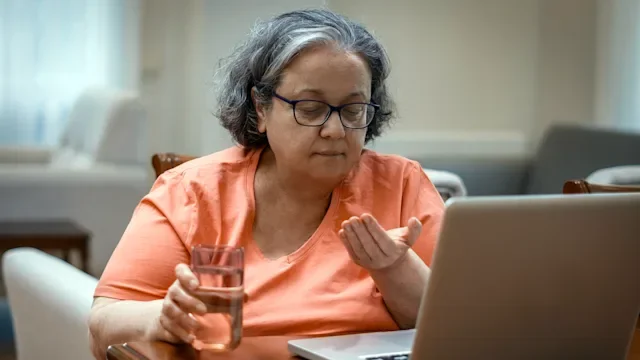Key takeaways:
It can be challenging for caretakers to know when someone with dementia is nearing death.
A person with dementia who is in the final stages may get more agitated or confused, stop responding to people around them, and have no interest in eating or drinking.
As a caregiver, there are things you can do to bring comfort to a loved one with dementia who is dying. You can also prepare for their death in different ways to make the process easier for yourself.
Many people with dementia live long enough to reach the most advanced stages of the condition. At this last stage, it’s hard for them to communicate what they’re thinking or feeling. This can make it hard to know when they’re in the final days or hours before death.
If you’re caring for someone with dementia, there are some signs that can help you know when they’re nearing the end of their life. Preparing ahead of time can help alleviate some of the stress, grief, and uncertainty that naturally occurs during this time.
How do you know when someone is near death with dementia?
Everyone follows a different path through the stages of dementia. Even if someone is in the late stages, it doesn’t necessarily mean that death is near. But there are some common signs that may show a person with dementia is nearing the end of their life.
Search and compare options
1. Changes in behavior
You’ll likely notice a change or a decline in their mental status. This can look different for each person, but you may notice they’re more:
Withdrawn
Restless
Agitated
Confused
Emotional
It’s also common for people — with or without dementia — to have hallucinations as they near death. Some may see or speak to people who have already died. Others may describe scenarios or scenes that seem to come from a different level of consciousness. These experiences can be distressing. But for many people who are dying, they’re actually calming.
2. They stop speaking
As death nears, it’s common for people to be less talkative or interactive. They may stop speaking or responding altogether.
3. They sleep more
In addition to decreased talking and responsiveness, you’ll probably notice they’re sleeping a lot more than normal. Most people won’t leave their bed in the final days before death.
4. They stop eating or drinking
In the days or weeks before death, most people have a complete loss of interest in eating or drinking. This can be particularly hard for family and caregivers to see. It’s important not to force someone with dementia to eat or drink if they aren’t interested. Most people who are dying don’t experience thirst or hunger, so they aren’t suffering.
A guide to end-of-life care: We’ve created a comprehensive guide for people and their families as they go through end-of-life care.
End-of-life planning: There are a lot of decisions and logistics involved in end-of-life care. We go through a checklist of what to do so you and your family are prepared.
The end-of-life surge: Many people experience a sudden burst of energy or mental clarity right before death. Learn how to recognize this mysterious phenomenon.
5. Trouble swallowing
If someone is still eating or drinking, you may notice that swallowing seems more difficult. This can often appear like coughing or even choking during or after eating. Food may also remain in their cheeks or mouth after eating.
6. Breathing changes
People who are close to dying may breathe quickly, slowly, or they may gasp for air. They may also have moments when they stop breathing completely for a few seconds before starting again.
You may also hear more congestion in their throat and chest, as secretions gather in these places. This is often described as a “death rattle.” While it can be difficult for caregivers to hear, it usually means the person is in their final hours.
7. Their body temperature drops
You may notice their skin, especially on their hands and feet, feels cooler to the touch.
8. Heart rate changes
Their pulse may speed up or slow down. In the final hours, it typically slows down as circulation decreases.
9. Skin changes
A lower body temperature and decreased circulation usually lead to noticeable changes in skin color. Their skin may look more pale or gray. Their extremities — especially the legs and feet — may also become blue or mottled. When these changes appear in the upper extremities, this can be a sign that death is near.
10. Bladder changes
As the kidneys start to shut down, they’ll make less urine. Decreased urine output — or really dark urine — can be a sign someone is nearing death. As their muscles relax, this can also lead to urinary incontinence.
11. Bowel changes
Similar to urinating, people often have less frequent bowel movements in the days and weeks before death. Muscle relaxation in the intestines can also cause episodes of bowel incontinence.
12. They may have moments of clarity or energy
Some people will have a short burst of physical or mental energy in the hours or days before they die. This is called “paradoxical” or “terminal lucidity.” A person with dementia may suddenly remember loved ones, recognize family, or share a smile or clear look before passing.
These signs are common, but not every person with dementia will follow this progression. And these signs don’t always mean that death is near. Some people with advanced dementia may live with these symptoms for several months. For most, it’s a gradual decline.
What are causes of death in someone with dementia?
For someone with dementia, the cause of death isn’t always obvious. There may not be a definitive illness that comes right before death. A person with dementia can die from dementia.
But often, someone with dementia will die from another illness. And that illness may or may not be related to their dementia.
Some complications from dementia that can lead to death include:
Blood clot: When someone isn’t moving around much, they’re at higher risk of blood clots. A clot can travel to the lungs or brain and be fatal.
Urinary tract infection (UTI): Dementia can make it harder to fully empty your bladder. This increases the risk of developing a UTI. In older adults, UTIs can be more serious and lead to sepsis, which is life-threatening.
Pneumonia: Since dementia can affect swallowing, food or saliva may accidentally go into the lungs. This can then lead to pneumonia, which can also be life-threatening.
How to prepare for the death of someone with dementia
If you’re caring for someone with dementia, an end-of-life care plan can help take away a lot of the stress and fear around death. Even though it can be hard to talk about these topics, it’s never too soon to discuss future care. This is especially important with dementia, since the condition can affect a person’s ability to make decisions for themselves in the final stages.
Talk to the person about what they want
It’s important to discuss advance care planning with your loved one. This way, you’ll know what types of treatments they want — or don’t want — near the end of their life. This is sometimes called an advanced care directive or a living will.
If your loved one is no longer able to make these choices for themselves, reach out to their primary care provider. They can help guide you through options that make sense for their current health status.
Make legal and financial plans
There are many resources to help with the financial burden of caring for someone with dementia. There are also important legal documents to have in place that outline things like guardianship and power of attorney.
Provide comfort when you can
There are simple ways to provide comfort to someone with dementia who is dying. You can read to them, play music, brush their hair, or hold their hand. You can also use a scent that they like or give them something soft to hold. Often, just being present can bring comfort to both of you.
Most people believe that hearing is the last sense to go as someone nears the end of their life. Talking to a loved one or playing music may bring them comfort in their final days and hours.
Give yourself grace
Caregiving is a hard job. Many caregivers feel some sense of relief after a loved one with dementia dies. If you’re caring for someone with dementia, it’s OK to take breaks when you need them. Caring for yourself can help you better prepare and cope with their death.
Mental health resources and support
While caring for someone with dementia, it’s important to also take care of yourself. This is going to look different for everyone. But below are some ideas of how to practice self-care as a caregiver:
Join a support group. Search online for local groups that arrange events in person or virtually.
Try relaxation techniques. There are many different breathing exercises that can help keep you calm and present. A simple one is to close your eyes, imagine a place that is calm, and focus on taking slow, deep breaths. This simple exercise can lower your stress level.
Tap into community resources. The Alzheimer’s Association, for example, has an online community resource center with easy access to services like social engagement groups, education programs, and tools for self-care.
Connect with friends and family. Create a calendar so loved ones, friends, and others know when you need support. Reach out to your support group when you need some company or time to unwind.
Don’t be shy about seeking professional help. Mental health professionals can guide you through understanding and managing your feelings. Together, you can build a plan that helps you process the stress and grief you may feel before and after the death of a loved one.
Most importantly, take time for yourself. Caregiving can make it feel like your whole world revolves around the care of another. But your own health and well-being must be a priority.
Take time to:
Engage in hobbies and activities that bring you joy
Ask others for help or take breaks when you need them
Get some physical exercise, which can be as simple as a walk around the neighborhood
Tend to your own healthcare needs, like visiting your primary care provider
Connect with friends and loved ones
The bottom line
Many people with dementia can live until the last, most advanced stage of the condition. This can make it harder to know when they’re nearing death. As a caregiver, you may have an intuitive sense of when your loved one is in their final days. Still, knowing a few signs to look for may help you feel less lost or anxious about the process. Most importantly, remember to take care of yourself when you’re caring for someone with dementia. It’s OK to take breaks and ask for help when you need it.

Why trust our experts?


References
Alzheimer’s Association. (n.d.). Financial and legal planning for caregivers.
Alzheimer’s Society. (n.d.). How to know when a person with dementia is nearing the end of their life.
Alzheimer’s Association. (n.d.). Legal documents.
Alzheimer’s Society. (2021). Coping with the death of a person with dementia.
Dementia UK. (2023). Dementia end of life care – late stage dementia.
Eisenmann, Y., et al. (2020). Palliative care in advanced dementia. Frontiers in Psychiatry.
Marie Curie. (2023). Caring for someone with dementia towards the end of life.














